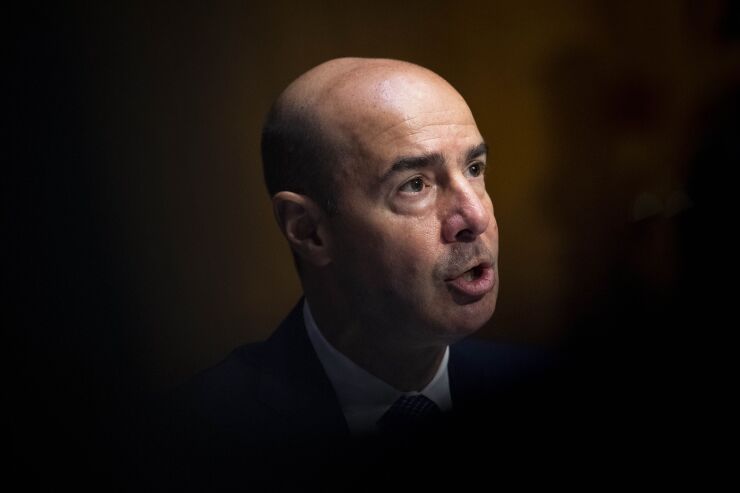
WASHINGTON — The Bank Policy Institute, which represents the nation's largest banks, has hired former Trump Labor Secretary and longtime corporate litigator Eugene Scalia to advise
"Mr. Scalia has been retained by BPI to advise on potential litigation strategy related to the banking agencies' Basel proposal," said a BPI spokesperson. Scalia did not immediately respond to requests for comment.
In October 2023, during a
"The [proposal] reads like 500 pages of math equations preceded by 500 pages describing math equations; what's absent is an explanation of why we need these equations, why we need to set the numbers where they are, what the target is,"
Scalia's argument resembles one he has made numerous times in his career challenging regulations on behalf of business interests, and as the rulemaking process continues, sheds light on the strategy the banking industry will continue to take to slow or stop the top U.S. bank regulators from forcing the largest banks to put down greater capital to prevent failures. Scalia's long and successful career in challenging rules on procedural grounds makes him perfectly suited to do just that.
The son of former Supreme Court Justice Antonin Scalia, Eugene Scalia has worked in private practice at Gibson Dunn since 1990. The firm has a long track record of retaining successful conservative legal talent, including Ken Starr, who led the independent investigation of former President Bill Clinton's extramarital affair in the 1990s, and former U.S. Solicitor General Theodore Olsen, who defended Bush in an electoral recount dispute in 2000 when Scalia's father was a sitting Supreme Court Justice.
Over the years, Scalia has taken hiatuses from private practice to inhabit high level positions in the Bush and Trump Labor Departments, most recently as Trump's labor secretary.
Scalia himself has represented high profile business clients for some time. He argued on behalf of the U.S. Chamber of Commerce in opposing workplace
But Scalia has developed a strong reputation as a fighter of federal financial regulations on behalf of business interests, especially concerning violations of the Administrative Procedure Act.
Former FDIC lawyer and professor Todd Phillips noted Scalia has made his career out of arguing various financial regulatory reforms violate a directive contained in a 1993 executive order saying agencies must weigh the costs of any new rules and that regulatory action can only come to fruition if the benefits of a regulation justify the costs.
"When he litigates about something, it is on these [administrative] grounds," he said. "They have hired the premier lawyer to make those arguments for them."
Scalia began
He served as counsel for the Chamber of Commerce again in the case
Banks and their trade group representatives have been vocal in their opposition to the Basel proposal and have availed themselves of
Even with the comment period
Analyst Jaret Seiberg of TD Cowen says the process of reviewing, analyzing and rebutting commenters' concerns means they are far from the finish line, and likely will not finalize the rule until 2025, and that's only if the Fed, Federal Deposit Insurance Corp. and Office of the Comptroller of the Currency don't rescind the proposal and start again from scratch.
"There continues to be confusion over the timeline for Endgame," said Seiberg. "[The Fed] will then consider that feedback before finalizing the rule."
Phillips says that legal precedent states that fortifying the rule against challenges may be largely dependent on how thoroughly the agencies hear and respond to industry complaints.
"Courts have interpreted that to basically mean: You need to explain all of the decisions you've made to the extent that commenters are providing data, ... they don't need to do a full-on cost benefit analysis, what they need to do is justify [the proposal] using all of the evidence that was presented," he said. "They just need to do an adequate explanation to show that the outcome is not arbitrary and capricious."






